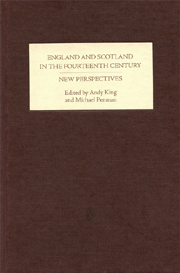Book contents
- Frontmatter
- Contents
- List of Contributors
- Acknowledgements
- Abbreviations
- 1 Introduction: Anglo-Scottish Relations in the Fourteenth Century – An Overview of Recent Research
- 2 The English Army and the Scottish Campaign of 1310–1311
- 3 ‘Shock and Awe’: The Use of Terror as a Psychological Weapon during the Bruce–Balliol Civil War, 1332–1338
- 4 The Scots and Guns
- 5 Edward Balliol: A Re-evaluation of his Early Career, c. 1282–1332
- 6 Scoti Anglicati: Scots in Plantagenet Allegiance during the Fourteenth Century
- 7 Best of Enemies: Were the Fourteenth-Century Anglo-Scottish Marches a ‘Frontier Society’?
- 8 Dividing the Spoils: War, Schism and Religious Patronage on the Anglo-Scottish Border, c.1332–c.1400
- 9 The Pope, the Scots, and their ‘Self-Styled’ King: John XXII's Anglo-Scottish Policy, 1316–1334
- 10 Sovereignty, Diplomacy and Petitioning: Scotland and the English Parliament in the First Half of the Fourteenth Century
- 11 National and Political Identity in Anglo-Scottish Relations, c.1286–1377: A Governmental Perspective
- 12 Anglici caudati: abuse of the English in Fourteenth-Century Scottish Chronicles, Literature and Records
- 13 Anglo-Scottish Relations in the Later Fourteenth Century: Alienation or Acculturation?
- Index
10 - Sovereignty, Diplomacy and Petitioning: Scotland and the English Parliament in the First Half of the Fourteenth Century
Published online by Cambridge University Press: 12 September 2012
- Frontmatter
- Contents
- List of Contributors
- Acknowledgements
- Abbreviations
- 1 Introduction: Anglo-Scottish Relations in the Fourteenth Century – An Overview of Recent Research
- 2 The English Army and the Scottish Campaign of 1310–1311
- 3 ‘Shock and Awe’: The Use of Terror as a Psychological Weapon during the Bruce–Balliol Civil War, 1332–1338
- 4 The Scots and Guns
- 5 Edward Balliol: A Re-evaluation of his Early Career, c. 1282–1332
- 6 Scoti Anglicati: Scots in Plantagenet Allegiance during the Fourteenth Century
- 7 Best of Enemies: Were the Fourteenth-Century Anglo-Scottish Marches a ‘Frontier Society’?
- 8 Dividing the Spoils: War, Schism and Religious Patronage on the Anglo-Scottish Border, c.1332–c.1400
- 9 The Pope, the Scots, and their ‘Self-Styled’ King: John XXII's Anglo-Scottish Policy, 1316–1334
- 10 Sovereignty, Diplomacy and Petitioning: Scotland and the English Parliament in the First Half of the Fourteenth Century
- 11 National and Political Identity in Anglo-Scottish Relations, c.1286–1377: A Governmental Perspective
- 12 Anglici caudati: abuse of the English in Fourteenth-Century Scottish Chronicles, Literature and Records
- 13 Anglo-Scottish Relations in the Later Fourteenth Century: Alienation or Acculturation?
- Index
Summary
One of the peculiarities of scholarship on the medieval English parliament is that the appointment of the committees of receivers and triers have received so little attention. This is surprising, not least because the long lists of receivers' and triers' names constitute one of the most visually striking sections of the contemporary record of parliament, the parliament roll. The receivers and triers formed the administrative and judicial framework which enabled parliament to handle complaints and requests of a private nature – that is to say, private petitions. Their appointment in parliament took place immediately after the chancellor's opening speech in which the reasons for summoning parliament were explained to the assembled Lords and Commons. The speech normally ended with a statement to the effect that the king wished to provide justice to all his subjects and that those who wished to submit complaints should hand them to the receivers within a certain specified time. The receivers (who were normally chancery clerks) would then pass the petitions on to the triers (royal judges and members of the lay and spiritual peerage) who would expedite as many as they could, sending any particularly difficult cases which required the application of the king's grace onto the king and council.
One of the reasons why these committees of receivers and triers have been neglected by scholars is because of an ambivalence about their true signifi- cance in the medieval parliament.
- Type
- Chapter
- Information
- England and Scotland in the Fourteenth CenturyNew Perspectives, pp. 172 - 195Publisher: Boydell & BrewerPrint publication year: 2007



